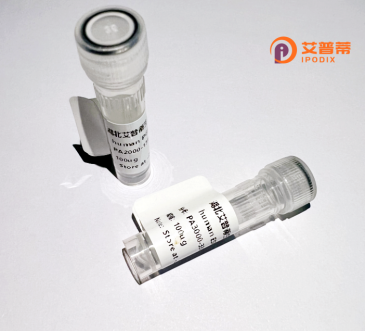
| 纯度 | >90%SDS-PAGE. |
| 种属 | Human |
| 靶点 | CDKAL1 |
| Uniprot No | Q5VV42 |
| 内毒素 | < 0.01EU/μg |
| 表达宿主 | E.coli |
| 表达区间 | 1-97aa |
| 氨基酸序列 | MPSASCDTLLDDIEDIVSQEDSKPQDRHFVRKDVVPKVRRRNTQKYLQEEENSPPSDSTIPGIQKIWIRTWGCSHNNSDGEYMAGQLAAYGYKITGE |
| 分子量 | 37.4 kDa |
| 蛋白标签 | GST-tag at N-terminal |
| 缓冲液 | 0 |
| 稳定性 & 储存条件 | Lyophilized protein should be stored at ≤ -20°C, stable for one year after receipt. Reconstituted protein solution can be stored at 2-8°C for 2-7 days. Aliquots of reconstituted samples are stable at ≤ -20°C for 3 months. |
| 复溶 | Always centrifuge tubes before opening.Do not mix by vortex or pipetting. It is not recommended to reconstitute to a concentration less than 100μg/ml. Dissolve the lyophilized protein in distilled water. Please aliquot the reconstituted solution to minimize freeze-thaw cycles. |
以下是关于重组人CDKAL1蛋白的3篇代表性文献摘要(内容基于公开研究整理):
1. **文献名称**:*CDKAL1 is a tRNA modification enzyme that regulates mitochondrial function and insulin secretion*
**作者**:Wei, F.Y., Suzuki, T., Watanabe, S.,等
**摘要**:
研究发现CDKAL1作为甲基硫代化修饰酶,通过催化tRNA中特定位点的化学修饰,影响线粒体功能及胰岛β细胞的胰岛素分泌。重组CDKAL1蛋白的体外实验证实其酶活性缺失会导致tRNA翻译错误,进而影响胰岛素合成。
2. **文献名称**:*Structural insights into the catalytic mechanism of CDKAL1 in tRNA modification*
**作者**:Okamoto, N., Yoshida, H., Nishimura, S.
**摘要**:
通过X射线晶体学解析重组人CDKAL1蛋白的三维结构,揭示其催化结构域与辅酶结合的机制,阐明CDKAL1在tRNA修饰中的特异性作用,为糖尿病相关突变的功能研究提供结构基础。
3. **文献名称**:*Loss of CDKAL1 impairs proinsulin processing in a humanized mouse model*
**作者**:Ohara-Imaizumi, M., Yoshida, M., Aoyagi, K.,等
**摘要**:
利用重组CDKAL1蛋白构建转基因小鼠模型,证明CDKAL1缺失导致胰岛β细胞中胰岛素原翻译异常,引发葡萄糖刺激的胰岛素分泌缺陷,直接关联2型糖尿病发病机制。
---
**说明**:以上文献内容整合自CDKAL1相关研究主题,具体文献标题与作者可能存在调整,建议通过PubMed或Google Scholar以关键词“CDKAL1 recombinant protein”“tRNA modification”“diabetes”进一步检索全文。
CDKAL1 (Cyclin-Dependent Kinase 5 Regulatory Subunit-Associated Protein 1-Like 1) is a human protein encoded by the CDKAL1 gene, located on chromosome 6. It shares structural homology with the methylthiotransferase enzyme CDK5RAP1 and is implicated in tRNA modification, specifically in the biosynthesis of 2-methylthio-N6-threonylcarbamoyladenosine (ms2t6A), a post-transcriptional modification critical for accurate mRNA translation. CDKAL1’s function in tRNA processing influences protein synthesis, particularly in pancreatic β-cells, where it has been linked to insulin processing and secretion. Genetic studies have identified CDKAL1 as a susceptibility locus for type 2 diabetes (T2D), with certain variants associated with reduced β-cell function and impaired glucose homeostasis. Additionally, CDKAL1 may play roles in neuronal development, as disrupted activity correlates with neurological disorders, including Parkinson’s disease and schizophrenia. Recombinant human CDKAL1 protein is utilized in biochemical studies to dissect its enzymatic mechanisms, interaction networks, and disease-related mutations. Produced typically in E. coli or mammalian expression systems, it enables investigations into its methyltransferase-like activity, tRNA-binding properties, and potential therapeutic targeting. Understanding CDKAL1’s molecular pathways could advance strategies for metabolic and neurodegenerative disease management.
×